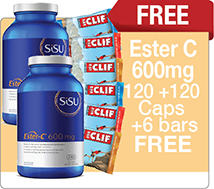C. Difficle
Updated Oct. 13th, 2017
Antibiotics strip our gut of not only the 'bad bacteria', but the healthy, normal and essential gut flora, as well. This leaves opportunistic bacteria ('bad') with a breeding ground for infection, unopposed by our natural defences in the form of healthy bacteria. All that being said, if C. Difficile is one of these opportunistic bugs, why not fight it off with a probiotic, replace and rebalance the gut flora so C. Difficile can't thrive? Sounds like a fairly simple solution to me!
What is it?
Clostridium Difficile is a gram positive bacteria. C. Difficile and their spores are found in feces. People can get infected when coming in contact with surfaces contaminated by the infected feces. Healthcare workers can also spread the infection if their hands or clothing are contaminated. C. Difficile does not pose a threat to those who are in good health, but can be life threatening for those who are immunocompromised, like the elderly and infants, as well as those taking antibiotics. Individuals are most commonly infected during hospital stays or while in nursing homes, although outbreak in the greater community or out-patient settings are becoming more and more common. The rate of C. Difficile acquisition is 50% in individuals with hospital stays equal to, or greater than 4 weeks. Some studies have shown that fluoroquinolones (a type of anti-biotic) are the most commonly associated with C. Difficile infections. Antibiotic use increases the chance of developing C. Difficile, as these bacteria can only flourish in an environment where there is an imbalance of normal gut flora, or the "good bacteria" has been wiped out, ie; high dose antibiotics or long term anti-biotic use. It then produces toxins, which ultimately damage the bowel.
Symptoms and Recurrence
C. Difficile causes a number of severe gastrointestinal symptoms, however the most prominent and common is severe diarrhea. There will often be an especially foul odour attributed to the diarrhea that affects patients of C. Difficile. Other symptoms include abdominal pain and cramping, fever and some gastrointestinal side effects like inflammation of the colon (pseudomembranous colitis). There are many antibiotics available for this super bug, however they are rarely effective enough to treat it adequately. Even the most effective antibiotics for c. difficile - bacitracin, metronidazole and vancomycin – will still leave the patient with a 20% recurrence rate. Once an individual has had a recurrence of c. difficile, they will have an even greater chance of recurrence each time they fall ill with it.
The Mighty Saccharomyces
Saccharomyces boulardii is one specific strain of PROBIOTIC that has been linked to effective treatment and prevention of C. Difficile infection, as well as more general antibiotic induced diarrhea. One theory is that this non-colonizing species of yeast actually competes with pathogens for receptor sites on the cells of the intestinal wall, preventing them from binding and causing infection. Although a variety of species of lactobacilli, Lactobacilli rhamnosus among the most widely studied, have been shown effective in treating and preventing antibiotic associated diarrhea in general, studies suggest that only Saccharomyces boulardii is effective against C. Difficile. It has been shown to inhibit both initial and further regrowth of C. Difficile. S. Boulardii is often combined in studies with the above mentioned antibiotics (most commonly Vancomysin) and significantly less recurrence of diarrhea has been observed when compared with Vancomysin and placebo.
Saccharomyces boulardii can be purchased as a supplement, both on its own, or in combination with other probiotics. In terms of treatment and prevention of C. Difficile, Saccharomyces boulardii is recommended in dosages anywhere from 5 – 20 billion cells/day. probiotics, in general, have a great safety profile with few to no side effects reported by those who use them.






















